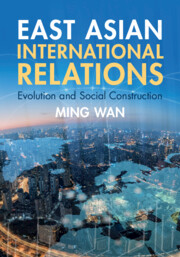Book contents
- East Asian International Relations
- East Asian International Relations
- Copyright page
- Dedication
- Contents
- Figures
- Maps
- Tables
- Preface
- Acknowledgments
- Abbreviations
- Part I Introduction and Theory
- Part II Historical Background
- Part III East Asia since 1945
- 5 East Asian Security
- 6 East Asian Growth
- 7 East Asian Money
- 8 East Asian Regionalism
- 9 The U.S.-China Strategic Rivalry
- 10 Democracy versus Autocracy
- References
- Index
8 - East Asian Regionalism
from Part III - East Asia since 1945
Published online by Cambridge University Press: 28 November 2024
- East Asian International Relations
- East Asian International Relations
- Copyright page
- Dedication
- Contents
- Figures
- Maps
- Tables
- Preface
- Acknowledgments
- Abbreviations
- Part I Introduction and Theory
- Part II Historical Background
- Part III East Asia since 1945
- 5 East Asian Security
- 6 East Asian Growth
- 7 East Asian Money
- 8 East Asian Regionalism
- 9 The U.S.-China Strategic Rivalry
- 10 Democracy versus Autocracy
- References
- Index
Summary
Chapter 8 analyzes East Asian regionalism projects, which demonstrate that the choices of governments and non-state actors constitute the structure of East Asian international relations, albeit within evolutionary constraints. East Asian countries are not integrating in a European Union sense, but their desire for and efforts at regional cooperation remain strong. East Asian regionalism was underdeveloped compared to Europe and some other developing regions, but an economic regionalism open to non-East Asian countries emerged when the Cold War ended. The 1997 Asian Financial Crisis trigged greater East Asian efforts at creating more exclusive economic and financial groups, but East Asia has shifted to mega regionalism since the early 2010s, reflecting growing great power rivalries between Japan, China, and the United States. Other East Asian countries, particularly those in the Association of Southeast Asian Nations (ASEAN), have their own agency and drive the process in more immediate terms.
Keywords
- Type
- Chapter
- Information
- East Asian International RelationsEvolution and Social Construction, pp. 220 - 247Publisher: Cambridge University PressPrint publication year: 2024

